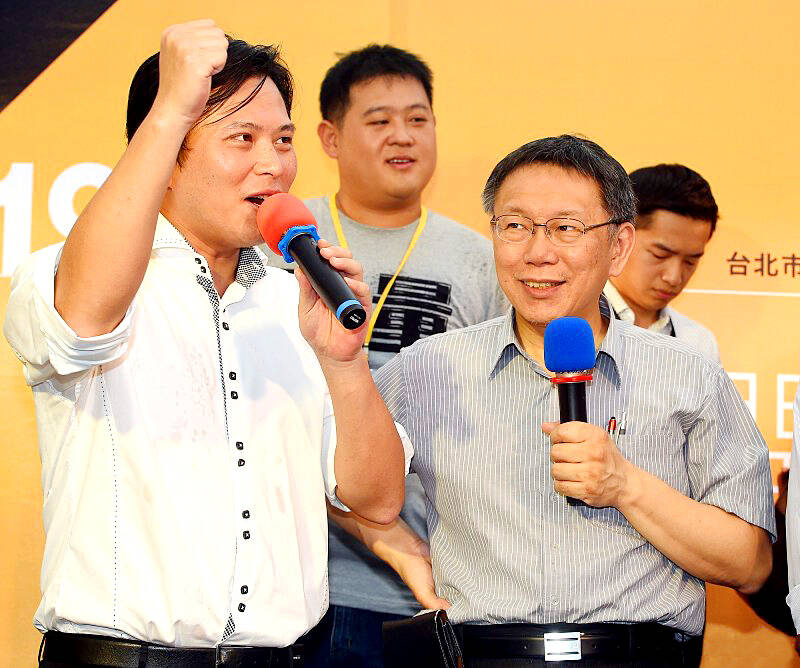Former New Power Party (NPP) legislator Huang Kuo-chang (黃國昌) on Thursday announced that he had filed the necessary documents to join the Taiwan People’s Party (TPP), which is set to nominate him as a legislator-at-large candidate.
Huang announced his decision in a letter to his colleagues at the Taiwan Anti-corruption and Whistleblower Protection Association, which he cofounded, saying he identifies with Ko’s vision of forming Taiwan’s first coalition government.
Huang and TPP Chairman Ko Wen-je (柯文哲) appeared on Thursday night on a livestreamed program hosted by influencer Holger Chen (陳之漢), during which Ko said he would like to recruit Huang and put him on the TPP’s list of legislator-at-large nominees, to be unveiled tomorrow.

Photo: Taipei Times
Ko said he stumped for Huang when he was campaigning for a legislative seat in New Taipei City’s Sijhih District (汐止) in 2016.
“He’s the man,” Ko said, praising Huang’s ability to discover corruption in his former capacity as a legislator.
Huang said during the show that he supported the idea of a coalition government as he is against the over-concentration of political power, which he said has been a hallmark of the Democratic Progressive Party (DPP) administration over the past seven years.
He said after the student-led Sunflower movement against the Cross-Strait Service Trade Agreement in 2014 turned into a brutal crackdown on protesters, DPP politicians promised to work to abolish the Assembly and Parade Act (集會遊行法) and push through a cross-strait agreement supervisory act, promises that have still not been realized.
“Any administration, DPP or Chinese Nationalist Party (KMT), needs effective checks and balances, without which there will be an over-concentration of power, which is what we are witnessing now,” Huang said.
Earlier in the day, the New Power Party, which Huang cofounded, said in a statement that it had received Huang’s application to renounce his membership.
Fellow Sunflower movement leader Lin Fei-fan (林飛帆) on Facebook yesterday said he was not surprised by Huang’s decision, “but more than that, I am sad for him.”
“Of course, it is equally inconceivable to me that he would stand with the KMT and TPP in advocating the reopening of the service trade agreement” or supporting the so-called “1992 consensus,” said Lin, who until recently was the DPP deputy secretary-general.
Ko earlier this year proposed restarting talks on the service trade agreement, despite also participating in Sunflower movement protests at the time.
“Protecting Taiwan from Chinese annexation is the reason we came together,” Lin said. “Ten years later, defending Taiwan is still the most important thing.”
Additional reporting by Kayleigh Madjar

Taiwan has received more than US$70 million in royalties as of the end of last year from developing the F-16V jet as countries worldwide purchase or upgrade to this popular model, government and military officials said on Saturday. Taiwan funded the development of the F-16V jet and ended up the sole investor as other countries withdrew from the program. Now the F-16V is increasingly popular and countries must pay Taiwan a percentage in royalties when they purchase new F-16V aircraft or upgrade older F-16 models. The next five years are expected to be the peak for these royalties, with Taiwan potentially earning

STAY IN YOUR LANE: As the US and Israel attack Iran, the ministry has warned China not to overstep by including Taiwanese citizens in its evacuation orders The Ministry of Foreign Affairs (MOFA) yesterday rebuked a statement by China’s embassy in Israel that it would evacuate Taiwanese holders of Chinese travel documents from Israel amid the latter’s escalating conflict with Iran. Tensions have risen across the Middle East in the wake of US and Israeli airstrikes on Iran beginning Saturday. China subsequently issued an evacuation notice for its citizens. In a news release, the Chinese embassy in Israel said holders of “Taiwan compatriot permits (台胞證)” issued to Taiwanese nationals by Chinese authorities for travel to China — could register for evacuation to Egypt. In Taipei, the ministry yesterday said Taiwan

Taiwan is awaiting official notification from the US regarding the status of the Agreement on Reciprocal Trade (ART) after the US Supreme Court ruled US President Donald Trump's global tariffs unconstitutional. Speaking to reporters before a legislative hearing today, Premier Cho Jung-tai (卓榮泰) said that Taiwan's negotiation team remains focused on ensuring that the bilateral trade deal remains intact despite the legal challenge to Trump's tariff policy. "The US has pledged to notify its trade partners once the subsequent administrative and legal processes are finalized, and that certainly includes Taiwan," Cho said when asked about opposition parties’ doubts that the ART was

If China chose to invade Taiwan tomorrow, it would only have to sever three undersea fiber-optic cable clusters to cause a data blackout, Jason Hsu (許毓仁), a senior fellow at the Hudson Institute and former Chinese Nationalist Party (KMT) legislator, told a US security panel yesterday. In a Taiwan contingency, cable disruption would be one of the earliest preinvasion actions and the signal that escalation had begun, he said, adding that Taiwan’s current cable repair capabilities are insufficient. The US-China Economic and Security Review Commission (USCC) yesterday held a hearing on US-China Competition Under the Sea, with Hsu speaking on